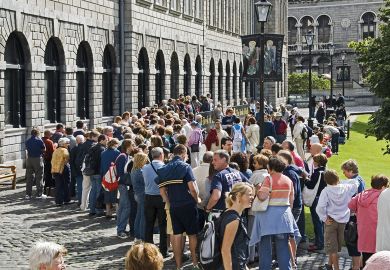Protesting has become a “full-time effort” for many Serbian students, who have spent months demanding accountability from the government following a deadly railway station collapse.
On 1 November, 15 people were killed when the concrete canopy of the Novi Sad railway station failed, months after the station was renovated. The disaster was the catalyst for thousands of demonstrators, led by students, to take to the streets to decry government corruption.
For months, student protesters have occupied university buildings and blocked roads, intensifying pressure on president Aleksandar Vučić and the populist Serbian Progressive Party. Prime minister Miloš Vučević resigned last week after several student protesters were attacked with baseball bats outside the party premises in Novi Sad, with one requiring hospitalisation. Alongside verbal and physical threats and attacks, protesters have also reported the use of excessive force by police.
On 30 January, hundreds began a march from Belgrade to Novi Sad, 50 miles to the north-west, where protesters were planning a bridge blockade to commemorate the three-month anniversary of the railway station collapse.
A group of students from the University of Novi Sad’s Faculty of Technical Sciences, who asked not to be named, told Times Higher Education that “protesting has become a full-time effort” for many, explaining: “While some students try to balance studies with activism, the urgency of the situation makes it difficult.”
“We recognise that our education is important, but so is fighting for the future where corruption does not put lives at risk,” they said. “This protest is about protecting both our present and future.”
Their demands, the students said, include “holding those responsible for the Novi Sad tragedy accountable, addressing systemic corruption in infrastructure projects and public institutions, prosecuting individuals who have attacked protesters, increasing funding for higher education and ensuring student voices are heard in policy decisions”.
While many university administrations have attempted to distance themselves from the demonstrations, with some publicly calling for the unrest to end, support has been widespread among academics, with more than 5,000 at the time of writing having put their names to an open letter endorsing the protests. “Their support has been invaluable in legitimising our movement and reinforcing the idea that this is not just a student issue but a broader societal concern,” the Novi Sad students told THE.
Tanja Todorović, a philosopher at the University of Novi Sad, formed the “Free University” network with colleagues, connecting supportive faculties across Serbia. She has helped to organise discussions and invite guest lecturers during faculty blockades, while bringing demonstrators “food, drinks, homemade pancakes, cooked meals, and other necessities”.
“Students and universities are among the rare institutions that possess legal autonomy and the ability to alert society when fundamental human rights and democratic institutions are at risk,” Todorović said.
“Most teaching activities have been suspended, with only essential university services still functioning,” she said, although students have organised events including reading clubs, film screenings and panel discussions. “Even though traditional classes are on hold, students are engaging in some of the most important lessons of their lives.”
Speaking to THE, the student protesters said they “refuse to be silenced by fear”, nor will they accept “superficial concessions” from the government. “Public support continues to grow, and history has shown that sustained, determined activism can lead to systemic change. We are not backing down until we see real accountability and action.”




